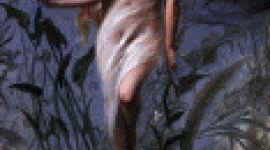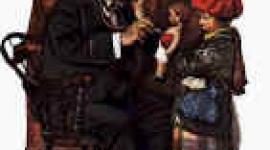A Lesson in Change that Changed My Life
Alan Adla on how after a big change in your life, you don't take things for granted anymore.
I was in an ambulance, bumping down a mountain road for an hour-and-a-half. Someone on a gurney was moaning at the top of his voice. It was me.
I was gripped by something that comes upon us from time-to-time, whether we like it or not: change. It wasn't something I felt I really needed.
I was aware of being tripped up by change for the first time when I was seven years old. One day I was playing with my friends and the next I was in bed with a case of polio. I got over that, but a year later, my dog died from eating leftover Chinese food and I got introduced to the biggest change there is. I suddenly realized that death is permanent. It won't go away; nothing you do can bring your dog back.
Then in my teens, I chose a profession that has change at its very core; I became an actor. People in other lines of work sometimes don't change jobs until years have gone by. Actors change them every few weeks. M*A*S*H, of course, went on for eleven years, but that was an oasis that only made a desert of change seem even hotter. Every new job is another set of challenges, with new skills to master, or fail at in a public way. And every few years the kind of part you were once right for is only right for the generation behind you.
You'd think after forty years or so of a life like this that I'd be used to change. But it still could surprise me when it made its blunt and unforgiving entrance. I suddenly had to leave the familiar place I was in and go into the unknown. I did know that if I didn't accept change I couldn't grow, I couldn't learn. I couldn't make progress at anything unless I was willing to go through this dark tunnel of uncertainty. So I went through it, but usually I went through it warily, sometimes even a little suspiciously.
It took a lesson on top of a mountain in Chile to make me accept change in a way I never had before. I think I even began to like it.
continue story below
I was in an observatory, in in a remote part of Chile, interviewing astronomers for a science program called Scientific American Frontiers. The show often called for me to do dangerous things in far-off places, and I was always a reluctant adventurer because I'm a cautious person. This wasn't dangerous; it was just talk, but suddenly something inside me literally started to die. My intestine had become crimped and its blood supply was choked off. Every few minutes more and more of it was going bad, and within a few hours, so would the rest of me.
The astronomers brought me down the mountain and hustled me to the closest town; not a very big one, but amazingly, there was a surgeon there who was expert in intestinal surgery. I had only a few hours. There was no chance to fly to a larger city.
It's not just that I'm cautious; I usually practice a form of caution almost indistinguishable from cowardice. And yet I wasn't frightened. It happened too quickly for fear to set in. Knowing I might not wake up from the surgery, I dictated a few words to my wife and children and grandchildren. And then I went under.
I woke up a few hours later with a deep understanding that this surgeon had given me my life. I was grateful to him in a way I had never been grateful to anyone before; I was grateful to the nurses and to the painkillers; I was grateful to the soft Chilean cheese they gave me to break my fast. The first bite of that bland cheese, because it was the first taste of food I had in my new life, was gloriously complex and delicious. Everything about life tasted good to me now. Everything was new and bright and shining.
I hadn't asked for this change and I certainly wouldn't have picked it if I had a choice, but it actually transformed and excited me.
When I got home, I saw that I was paying more attention to things. The way the cheese tasted when they finally let me eat again became the taste of life for me. And I began doing more of the things I care about and caring more about whatever things I did. It didn't matter if what I was doing was an official, important enterprise -- or a game on a computer screen. I gave it my attention. My sense of taste for everything had been heightened.
It's only been two years since that night in Chile. Maybe this will all go away, and maybe I'll take life more for granted again. But I hope not. I like the way it tastes.
Copyright © 2005 Alan Alda
About the author: Alan Alda played Hawkeye Pierce in the television series M*A*S*H and has acted in, written, and directed many feature films. He has starred often on Broadway and his avid interest in science has led to his hosting PBS's Scientific American Frontiers for eleven years. He was nominated for an Academy Award in 2005 and is the only person to win Emmy awards for acting, writing, and directing. He is married to children's book author/photographer Arlene Alda. They have three grown children and live in New York.
For more information, please visit www.alanaldabook.com.
APA Reference
Staff, H.
(2008, December 12). A Lesson in Change that Changed My Life, HealthyPlace. Retrieved
on 2026, February 28 from https://www.healthyplace.com/alternative-mental-health/sageplace/a-lesson-in-change-that-changed-my-life


